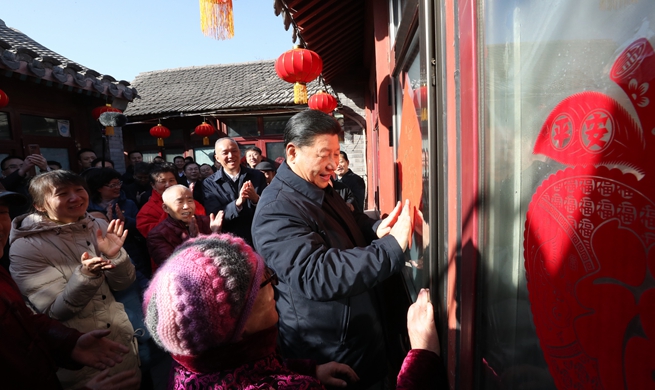BRUSSELS, Feb. 1 (Xinhua) -- Despite lingering divergences among European countries, the North Atlantic Treaty Organization (NATO) on Friday showed full support to the United States' suspending of its obligations under the INF Treaty.
Citing "Russia's material breach" to the historic Intermediate-Range Nuclear Forces (INF) Treaty, the North Atlantic Council, principal political decision-making body of NATO, urged Russia in a statement "to use the remaining six months to return to full and verifiable compliance to preserve the INF Treaty."
Washington announced earlier on Friday that the United States is withdrawing from the treaty, a move seen as exacerbating the risk of an international arms race.
Calling Washington's move as "a serious step", Russian Deputy Foreign Minister Sergei Ryabkov warned it would deal "a powerful blow to the still existing system of international arms control and non-proliferation of mass destruction weapons".
"It means an actual liberation of Washington from any restrictions related to the operation of the treaty," said Ryabkov in an interview with Russia 24 TV channel Friday.
Despite the claimed full support in the statement, NATO is far from a united front on this issue, as European countries, situated between the Atlantic and Russia, have the most vested interests in the treaty.
When U.S. President Donald Trump said in October last year that Washington would pull out of the INF treaty, shocked European officials responded quickly.
On Oct. 23, 2018, German Foreign Minister Heiko Maas told media that as the treaty concerns the vital interests of Europe, Germany will fight for it with all diplomatic approaches.
A day earlier, France, another major country in the European Union (EU), responded with a warning by its Foreign Ministry that "hasty" and "unilateral" decision on the INF Treaty would be "regrettable."
On the same day, French President Emmanuel Macron told Trump about the importance of the treaty especially in regard to European security.
Echoing Macron on Oct. 22 last year, European Commission Spokeswoman Maja Kocijancic said the treaty, one of the cornerstones of the European security structure, contributed to the end of the Cold War and the nuclear arms race. She urged the United States and Russia to remain engaged in dialogue.
The U.S. exit from the INF Treaty creates uncertainties with consequences including threatening regional and global stability and nuclear disarmament, Stefano Silvestri, former Italian undersecretary of state for defense told Xinhua in an interview last October.
"This is not a good message for global stability and the world's nuclear disarmament strategy ...," he said.
Signed in 1987 between the Soviet Union and the United States, the INF Treaty marks the first-ever pact reached by Washington and Moscow on nuclear disarmament and a major step forward in restricting the arms race.
However, the two sides have been accusing each other of violating the arms control agreement in recent years amid increasing tensions.

















